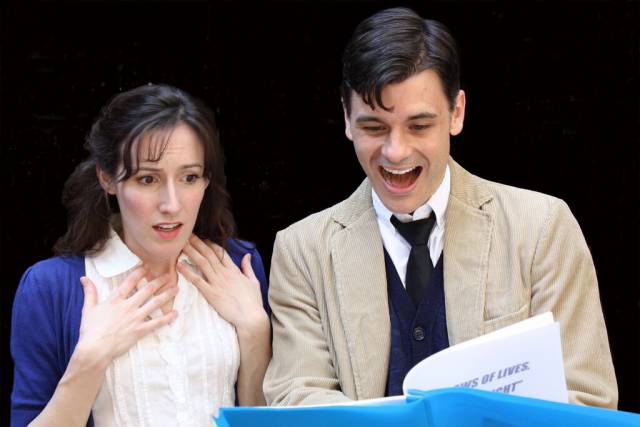

There are only two reasons why anyone would name their show What Do Critics Know? the first is that they’re aware they’ve created something so ghastly, that they’re trying to be funny in advance by acknowledging that it won’t be received well by the press. The second, and least likely in terms of probability, is that you’ve created a real winner, a show so wonderful that critics will not only praise it, but also pat themselves in the back for being in on the joke. The reason for Matthew Gurren and James Campodonico’s musical having that title is the latter. A delightful throwback to classic “let’s put on a show” musicals like Kiss Me Kate and Summer Stock, this is a piece that was obviously created by people who are deeply in love with the form.
If the title suggests it’ll be all about pitching critics against theatre, the show gets the last laugh as it’s not only not about that, but also campaigns for a better understanding of the ecosystem of theatre, and how essential it is for it to maintain its balance. “We all need each other” explains one of the characters near the end, which is something the show has expressed in more than one way throughout. But before discussing the finale, here’s the plot: composer Nathan Wood (an effectively romantic Chris Gleim) has had more flops than he ever imagined, his latest show Breakthrough was indeed far from that, as it got ravaged by the three most important theatre critics in New York: Chester (Ryan Knowles, scathingly delicious), Brad (scene stealer Prescott Seymour) and Irma (an exceptional Mary Mossberg), a trio who “file their claws” with their drinks as they sing each other’s praises (“there’s nothing hypocritical in being analytical, we’re just the very models of critics who are critical” they sing).
However Gurren and Campodonico paint them far from being joyless creatures, instead they’re protectors of what they consider a sacred art, which they believe Wood has offended more than enough. What they don’t take into consideration, and really few critics ever do because it’s not in their job description, is that whenever they “help” close a show, all the people behind it lose their income, and we see Wood having to go back to being a server at a restaurant owned by charming gangster Antonio (a hilarious and strangely lovable Danny Bolero) who decides to take matters into his own hands to make his employee feel better.
He convokes Chester, Brad and Irma and gives them an ultimatum: they have to endure the agony of putting together a Broadway musical, or else he will reveal their darkest secrets to the world. Terrified by the prospects of having people learn they are not precisely what they seem to be, the critics get to work and soon realize that obviously they can’t write a show. Here is where the show goes from being a potentially vicious revenge fantasy, into a love song to the whole world of theatre, as the critics feel the need to recruit actual writers and composers to help them out. The snobby Chester (which the writers seem to have shaped in the very form of Addison de Witt) takes Brad, and with the help of two charlatans who believe to be reincarnations of Bach (Jason Fleck) and Shakespeare (Bruce Rebold) they decide to do a highly stylized opera which will star diva Lina Bianchi (a hilarious Kimberly Doreen Burns).
Irma inversely decides to give Nathan another opportunity, she sees his potential, but he’s failed to exploit it because he’s too arrogant to accept feedback (“a good idea is no excuse for lazy execution, talent is a bonus but it’s no substitution”). A recurring theme in the show is the chain of fear in theatre, as actors are afraid to tell writers they’ve written crap, which the writers are afraid critics will shatter afterwards. Reluctantly Nathan agrees to receive Irma’s feedback and together they do a modern tragedy set to star the ambitious starlet Dahlia (Sarah Stevens).
Kudos to the writers for filling their book with unexpected twists as we see romantic pairings go outside the box, and featured players are all given the opportunity to be “real” characters instead of filler. The show’s ambition certainly makes it flawed in small ways, for example the blackmail subplot feels more like a McGuffin, rather than an actual threat, and there’s an icky twist which is explicitly justified by a character, but doesn’t feel less icky, unless it was being explored as a critique of corruption in journalism, perhaps the lesson is that the characters never learned their lesson?
What Do Critics Know? turned out to be a very pleasant surprise, filled with vibrant dance numbers, a lush, beautiful score and seamlessly energetic direction by Michael Bello. A long life should be in store for such a delightfully brainy show. By show’s end one should feel the need to challenge Mr. Campodonico and Mr. Gurren to write a piece of theatre criticism, instead the show is such a hug to theatre lovers, that all one wants to do is get in on some of the lovin’.